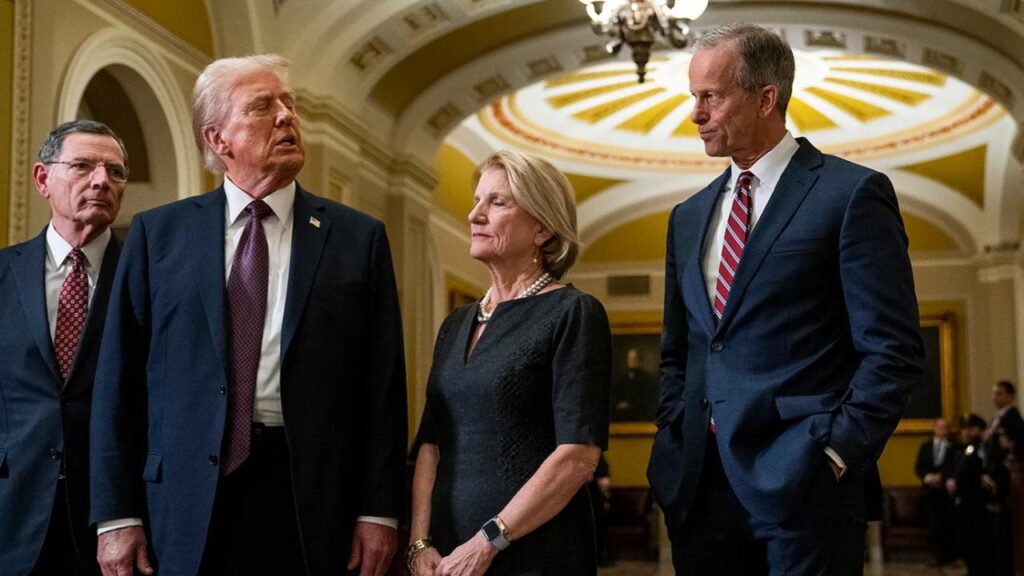In what may be one of the most pivotal weeks of 2025, Republicans are charging into crunch time on the “One Big Beautiful Bill”—or OBBBA—a sweeping megabill that fuses tax cuts, spending reforms, and debt ceiling tweaks into one politically loaded package. With GOP unity under stress and Trump’s legacy on the line, the stakes couldn’t be higher.

Republicans Enter Make-or-Break Week Over Trump’s Controversial Megabill
| Insight | Stat |
|---|---|
| Deficit impact | Adds roughly $2.6–$3.8 trillion to the debt over 10 years |
| Wealth transfer | Top 10% gain ~$12K/year; poorest 10% lose ~$1.6K/year |
| Medicaid cuts | Up to 8.6 million lose coverage due to work rules |
The One Big Beautiful Bill is about more than taxes or border walls—it’s a referendum on what the GOP stands for in 2025. The next few days will tell us if Republicans still believe in fiscal restraint or if Trump’s vision has fully taken hold.
What’s in the Bill?
The OBBBA isn’t just a tax bill—it’s an all-in-one vision of Trump-era conservatism reborn. Here’s a quick breakdown:
- Tax cuts, made permanent: Extends and expands the 2017 tax law. Adds new deductions for tips, overtime, and raises the cap on SALT deductions to $40,000.
- Work-for-welfare rules: Medicaid and food stamp recipients would have to meet work requirements. Experts estimate 8.6 million could lose coverage.
- Debt ceiling raised: The bill lifts the cap by $4 trillion, while adding an estimated $3 trillion in new deficits.
- Climate policy rollbacks: Clean-energy tax credits from the Biden era would be reversed, with funding redirected to oil, gas, and nuclear.
- Defense and border boosts: $150 billion for military spending, plus $70 billion for southern border enforcement.
Internal GOP Civil War
While Trump-aligned Republicans are eager to pass the bill before July 4, internal divisions are sharpening.
Senators like Rand Paul and Ron Johnson have gone public with their opposition, calling the bill fiscally reckless. “We’re torching the next generation’s economy,” Paul said last week, warning that the bill could balloon the deficit well beyond acceptable limits.
Moderate Republicans have concerns, too—not just about the deficit, but about how the bill plays in working-class districts. Some are privately warning that Medicaid cuts and energy layoffs could turn key swing voters against them. “You can’t call it conservative if it increases the debt by $3 trillion and hurts poor families,” Johnson told Fox News.
Big Benefits for the Wealthy, Big Risks for the Poor
Analysts from the Congressional Budget Office (CBO) and multiple nonpartisan groups are raising alarms:
- Top 10% of earners stand to gain an average of $12,000 per year.
- Lowest-income Americans would lose around $1,600 annually due to reduced aid and rising healthcare costs.
- Preventable deaths could rise by up to 50,000 annually if Medicaid access is slashed, according to projections based on prior coverage cuts.
For me, this feels like the latest round in a fight I’ve covered for years: sweeping economic reform dressed in populist language but burdened by regressive math. It’s a hard sell to voters when their real take-home gets smaller.

Trump’s Pressure Campaign
Donald Trump is taking an unusually hands-on role in whipping votes. According to reports, his team is offering prime committee assignments to holdouts and publicly calling out defectors.
In one awkward episode, Trump initially snubbed Sen. Rand Paul from a White House picnic—only to reverse course days later after a conservative backlash. The message was clear: cross Trump, and there are consequences.
Trending Now
A new poll suggests the public is split—barely—on Trump’s broader policy agenda, including his immigration push and economic plans. But among independents, support for the OBBBA drops significantly, especially after hearing details about Medicaid and tax changes. “I thought it was a tax cut for me,” one Iowa voter told NPR. “Now I’m not so sure.”
Timeline: What’s Next?
- Monday: Senate Finance and Budget committees begin markup.
- Wednesday–Friday: Floor debate; amendment votes possible.
- Next Week: GOP leadership eyes final passage before the July 4 recess.
If that timeline slips, it could mean the bill is in real trouble. Trump allies are warning of “market panic” if the bill collapses, though experts say that’s likely overblown.
What Happens If It Fails?
If the bill crashes:
- Trump takes a political hit.
- GOP unity fractures heading into midterms.
- Budget battles intensify this fall, with another shutdown showdown possible.
If it passes:
- Trump solidifies control of the GOP platform.
- Democrats prepare attack ads centered on wealth transfer and coverage losses.
- Fiscal conservatives may launch primary challenges from the right in 2026.






